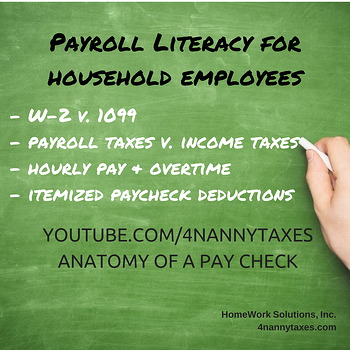 Nannies and senior caregivers who work in a private home, receive instructions and directions from the family employer and are paid by the family (either directly or via a household payroll company) are employees in the eyes of the IRS and US Department of Labor. As employees, many aspects of compensation and payroll are governed by payroll and labor law, no different than employees in a department store, factory or othr workplaces. Tax and labor law that covers household employees are often unique, and all too often neither the family nor the caregiver know the important details. Household payroll literacy on the part of a nanny or senior caregiver is important as they negotiate pay and benefits with their employers, many of whom don't understand these key points themselves.
Nannies and senior caregivers who work in a private home, receive instructions and directions from the family employer and are paid by the family (either directly or via a household payroll company) are employees in the eyes of the IRS and US Department of Labor. As employees, many aspects of compensation and payroll are governed by payroll and labor law, no different than employees in a department store, factory or othr workplaces. Tax and labor law that covers household employees are often unique, and all too often neither the family nor the caregiver know the important details. Household payroll literacy on the part of a nanny or senior caregiver is important as they negotiate pay and benefits with their employers, many of whom don't understand these key points themselves.
- Employees receive a W-2 form at the end of the year, not a 1099 form. This is important! 1099 Independent Contractors pay 100% of their own taxes; employees are issued a W-2 form and the employee and employer both contribute to the taxes.
- There is a distinction between payroll taxes and income taxes. Payroll taxes include Social Security, Medicare and unemployment taxes, and are an employer responsibility. Social Security and Medicare are shared taxes; the household employer may deduct 7.65% from the nanny caregiver's paycheck to fund the employee portion, and the employer will match this amount and must send the entire tax (15.3%) to the IRS. Unemployment taxes are totally paid by the household employer. Income taxes are ultimately the nanny caregiver's responsibility; the household employer may agree to deduct income taxes for the nanny caregiver from her paycheck but has no legal obligation to do so. It is critical for the nanny caregiver to understand what taxes are being deducted from their paycheck and to make provisions, if necessary, to pay their income taxes independently.
- Household employees are hourly, non-exempt employees. Your compensation agreement should state your wage in a rate per hour, and you are entitled to be paid this rate for all hours worked.
- Household employees are entitled to a detailed itemization of paycheck calculations and deductions. In the commercial world, employees receive a paycheck that itemizes hourly and overtime rates, the number of hours being paid in the period, and itemized deductions for the Social Security, Medicare and federal and state income taxes (where applicable) being deducted. A household employee is entitled to receive the same information from their employer.
- Household employees who do not live with their employer are entitled to overtime pay for hours over 40 in a 7 day work week, at no less than 1.5 times the hourly rate of pay. Many states extend the overtime benefit to household employees who live with their employer - it is important to familiarize yourself with the law where you work.
- The state where you work will determine your allowed pay frequency. Most household workers must be paid weekly or bi-weekly (every other week). Semi-monthly and monthly pay, where permitted, is discouraged due to the difficulty of tracking and paying overtime, which is ALWAYS based on a 7 day work week.

